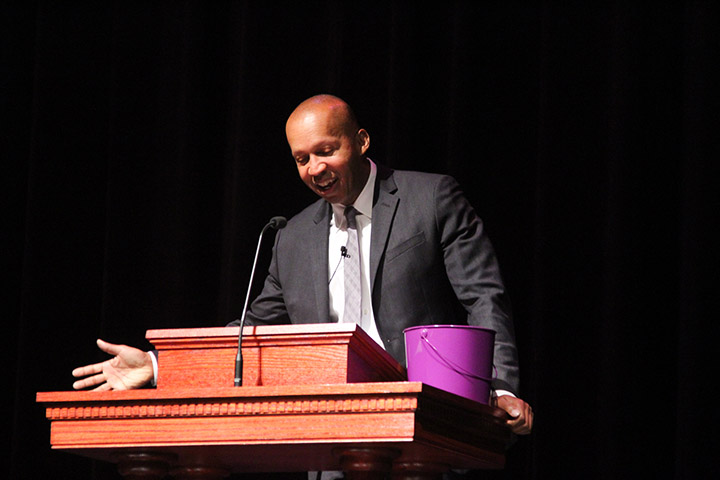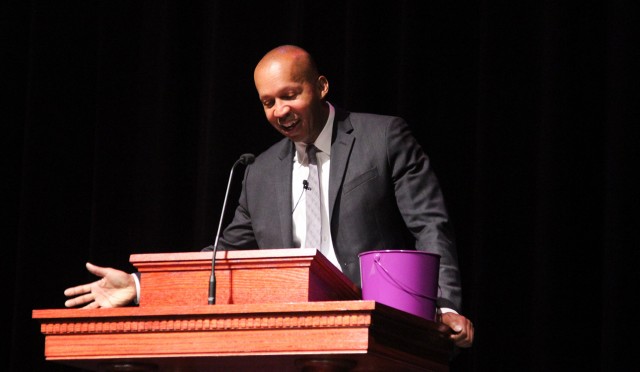
world with four things: having the power of proximity, changing the narrative, holding onto your hope and
choosing to do uncomfortable things. He also spoke about his clients’ experiences with racial injustice and
poverty and how he is working to change that.
Skye Duncan | Lariat Photo Editor
By Rachel Leland
Staff Writer
Renowned lawyer and prisoners’ rights activist Bryan Stevenson wants Baylor students to change the world.
Last night, Stevenson spoke to students about injustice of America’s criminal justice system and his work as the Executive Director of the Equal Justice Initiative at a lecture hosted by the Academy for Leader Development in Waco Hall which has brought six speakers to campus.
Stevenson’s flight was canceled because of the fog, so the Academy for Leader Development sent a driver to meet him at the airport in Dallas. The speaker walked across the stage an hour and ten minutes after the event was planned.
Students watched Stevenson’s acclaimed 2012 Ted Talk before the speaker arrived in an impromptu attempt to pass time.
Stevenson represents clients who are victims of the criminal justice system on a racial and socioeconomic bias, including Walter McMilian who was exonerated from a murder he did not commit in 1993. According to the Ted Talk, for every nine people executed in the United States, one person on death row is found innocent.
“In aviation, we would never let people fly on airplanes if for every nine planes that took off one would crash,” Stevenson said. “But somehow we can insulate ourselves from this problem. It’s not our problem. It’s not our burden. It’s not our struggle.”
Stevenson, a New York University law professor and Harvard graduate, said he spends most of his time visiting prison, jail, or on death row, where he says 2.3 million people currently awaiting end of their sentences, or in the case of those who await execution, their lives.
Stevenson, an African-American, does not ignore the asymmetry in sentencing and execution of black people versus white people.
“In the states of the Old South, we execute people — where you’re 11 times more likely to get the death penalty if the victim is white than if the victim is black, 22 times more likely to get it if the defendant is black and the victim is white,” Stevenson said.
When the speaker arrived he greeted the well-packed Waco Hall before quickly diving into his speech which he tailored for the Baylor audience.
“I get excited when I go to college campuses like Baylor because I believe that many of you come to college with something that’s rare and precious, and that’s heart, that’s vision, that’s hope,” said Stevenson.
Stevenson said he hoped the words he imparted to the auditorium would inspire the audience to change the world.
Stevenson, now 55, grew up in rural Alabama during segregation until a group of lawyers forced the local high school to honor desegregation policies. Stevenson attended college in Pennsylvania before attending Harvard Law school. He said he was disappointed to find did not explore racial or socioeconomic injustice enough.
“I ultimately found my way to an organization providing legal services to people on death row and it opened up this new world where things were changing,” Stevenson said.
Many of the people he represented were children. According to Stevenson there are currently 10,000 children serving time in an adult prison where they are eight times more likely to be raped.
“We’ve allowed this big gap to exist between where we are and where are most vulnerable children are,” Stevenson said.
The Equal Justice Initiative provides legal counsel to those whom the criminal justice system fails. One of the most common reasons the justice system fails is racial-bias, Stevenson said.
Stevenson said he attributes lingering injustice to the wounds of slavery and white-supremacy.
“We are heavily burdened by the legacy of racial inequality. This country has never really confronted the difficult challenges that have been created by our history of slavery and terrorism,” Stevenson said. “I’m talking about slavery, because I think we are still haunted by it.”
The Initiative released the Lynching in America report earlier this year documenting the 3959 people who were lynched between 1877-1950 including the 20 lynchings that took place in Waco between 1880 and 1920.



